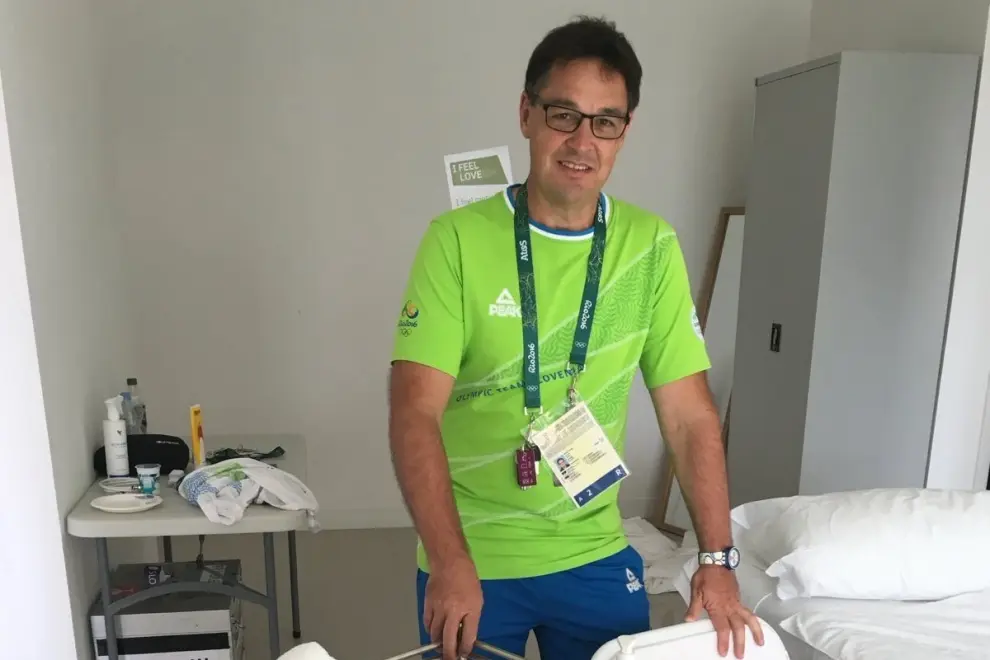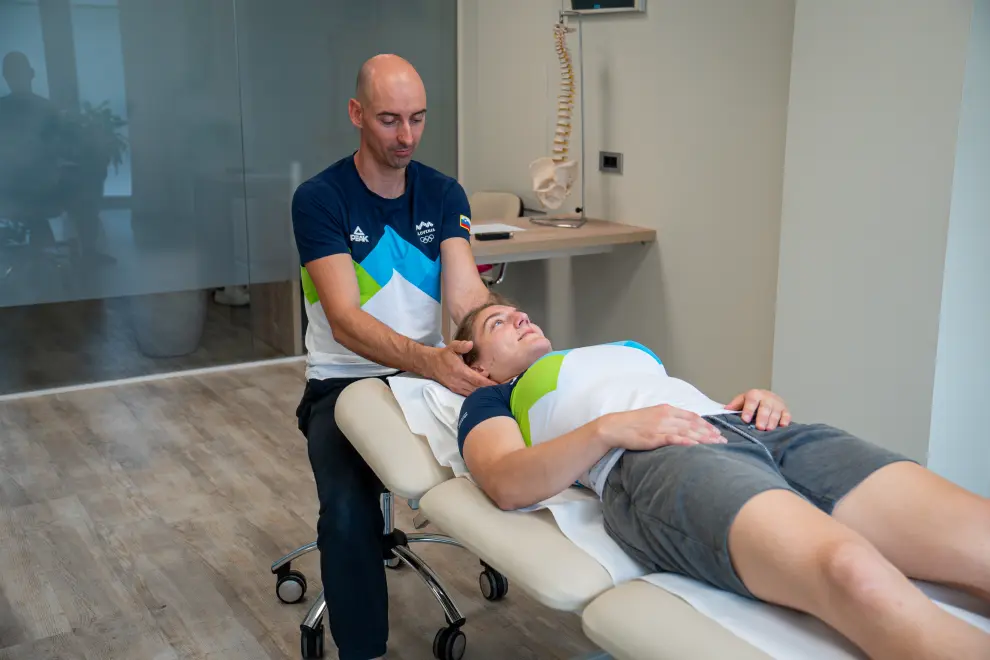Slovenian athletes head to Paris with top medical team
Slovenian athletes will travel to the Paris Olympics with a medical team that will provide them with quality care to ensure they are in the best possible shape. They are confident the Games may well be one of the more successful.
Slovenians will be cheering on a record 90 Slovenian athletes at this year's Olympics. Their medical team, made up of highly qualified doctors and physiotherapists, has been preparing intensively for the event for more than a year.
Matjaž Vogrin, head of the medical team and chairman of the Medical Commission of the Slovenian Olympic Committee (OKS), says their team takes care of the athletes throughout the entire preparation period - from one Olympics to the next.
With a network of Olympic Reference Sports and Medical Centres established a few years ago, athletes can access top-quality medical services at a number of locations across Slovenia any time, from diagnostics, surgery, therapy and physiotherapy to psychological support and appropriate nutrition.
"It's crucial that the medical team is assembled in time and that it includes only the best experts in their fields who can provide the highest quality medical care to the athletes. After all, this is about Olympic medals," says Vogrin, who has worked with top athletes for a long time. He also heads the medical team of the national football team.
The main goal of the Olympic medical team is to bring athletes to the Olympics healthy and fit, and to respond appropriately if health issues arise. Chief physiotherapist Jure Bornšek says it is very important that during the preparation period the athletes also do regular preventive exercise, specific training sessions and therapies to reduce the chance of injury.
Paris Games could be one of the more successful
Health-wise, all Slovenian athletes going to Paris are fit for the Olympic Games, Vogrin told the Slovenian Press Agency. Only one had to cancel her participation due to a serious injury.
Bornšek finds the athletes are very well prepared this year. "Sometimes in these competitions you need a good day, good conditions and a bit of luck. If all this comes together, I think the Paris Games will be one of the more successful ones," he says.
The medical team will travel to Paris a week before the Games, on 19 July. "This is when the athletes start arriving in the Olympic Village, and it's important that they are provided with medical care from the start," said Vogrin.
Good communication and cooperation vital
The medical team has its own premises at the Olympic Village, a "mini-medical centre" as Vogrin calls it, where they can perform medical activities. "This way, all athletes can request medical assistance at any time." At the same time the Olympic Village provides athletes with a clinic, an emergency centre and a pharmacy.
Doctors and physiotherapists hold daily meetings with the coaches of each athlete and team to coordinate plans for the coming day. "We decide who will be on duty for a particular event, check if any athletes are having problems, who needs medical attention and agree on how to act," Vogrin explains.
Each medical team member has their assignments at the Games. Vogrin's speciality is, for example, sports injuries, in which he specialises, but at the same time there has to be a doctor to take care of internal medicine, nutrition and hydration.
Doctors who specialise in injuries are usually more often present in combat sports, such as judo, where there is a greater chance of injury, while others cover areas where there is a greater strain on the cardiovascular system, Vogrin says.

Matjaž Vogrin, head of the Slovenian Olympic medical team, pictured in a surgery at the 2016 Rio de Janeiro Summer Olympics. Photo: Courtesy of Matjaž Vogrin
The medical team also includes orthopaedic surgeon Robi Kelc, Nada Rotovnik Kozjek, a doctor and athlete who heads the clinical nutrition unit at the Ljubljana Institute of Oncology, Matjaž Turel, a pulmonologist and internal medicine specialist, and neurosurgeon Saša Đurić.
Physiotherapists work alongside doctors all the time, as they jointly make up a complete healthcare team. "Most athletes have their own personal or club physiotherapist with whom they work throughout the season. So it often happens that I meet an athlete for the first time at the Olympics, but I have no problem with that. I do my job professionally and adapt to the athlete the best I can," Bornšek says.
Sometimes there are too many competition venues and the medical team cannot cover all areas at the same time. Good communication is therefore of key importance.
"For example, at this year's sailing competitions in Marseille, we will only have physical therapists, no doctors. But we will be in contact with doctors via phone and video, so we can take action if necessary," says Vogrin. The men's volleyball team will not have a doctor, while the women's and men's handball teams will have only one between them.
Walking the edge safely
Sometimes it is not clear before a competition whether an athlete will be able to compete due to an injury or deteriorating health condition. In such cases Bornšek says the medical team takes on great responsibility.
"We try to understand the athlete, for whom that competition means everything. But at the same time we have to be aware of the risk that the athlete may suffer even more serious injuries or damage to their health during the competition."
"In many cases, elite sport is very close to damaging health. Our job is to warn the athlete where that edge is, but at the same time to enable them to reach it safely," Vogrin says. But the final decision on whether to compete despite the risk is on the athlete.
"These are dramatic moments. In normal situations, athletes would certainly rest and not compete. But of course, with big competitions like the Olympics, which for some are literally a lifetime goal, it's different and they are often willing to take risks. Especially when Olympic medals are at stake," says Vogrin, who has witnessed such decisions by athletes on several occasions. "Athletes have won medals in this way in the past, fortunately without lasting consequences."

Jure Bornšek, head of the Slovenian Olympic physiotherapy team, treats judoka Andreja Leški. Photo: Jakob Pintar/STA
In exceptional cases, the medical team applies rapid methods to speed up recovery. For example, Bornšek used one of the physiotherapy methods on an athlete who suffered from back pain a few days before competing at the Tokyo Summer Olympics.
"I arrived at the Olympic Village the day after the onset and performed a specific spinal manipulation technique late in the evening that we don't normally do before a competition because it can cause a severe inflammatory reaction for a few days. This was handled with a large amount of painkillers, adapted training sessions and two therapies per day. A bad start, good ending - the athlete was able to compete afterwards without any problems," Bornšek recalls.
He says chronic injuries which prevent athletes from being optimally prepared for competition account for most injuries in athletes. Injuries are also often caused by busy schedules that leave athletes tired and stressed. During the Olympic year, many athletes adjust to the Games and many skip most of the season's competitions or only take part in the most important ones.
Trust key to success
Medical teams rarely perform serious procedures at the Olympics. "However, it is precisely in these critical moments that complete trust between athlete and doctor is essential to achieve the shared goals of both excellent sporting results and protecting the athlete's health," says Vogrin.
So, although the medical team usually works behind the scenes, it has a crucial and responsible role. "It's important not to expose ourselves, but to focus only on helping the athlete to the best of our ability. In practice, this means being present at the competitions, letting the athlete know you are there, but being so much on the sidelines that they forget about you," Bornšek explains.



